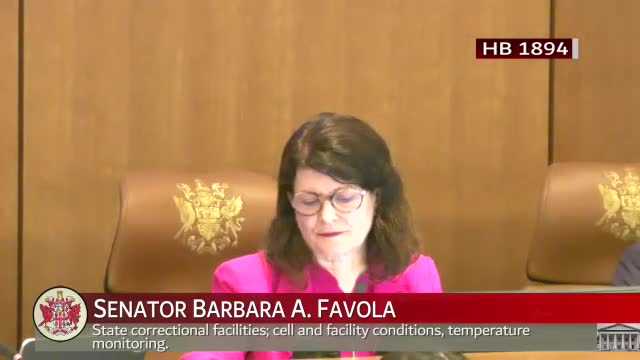Senate committee advances bill to limit extreme temperatures in Virginia prisons
Get AI-powered insights, summaries, and transcripts
Subscribe
Summary
The Senate Rehabilitation and Social Services Committee voted 9–6 to report a bill that would require climate-controlled prison facilities to keep interior temperatures between 65 and 80 degrees and direct the Department of Corrections to study remote temperature monitoring options.
The Senate Rehabilitation and Social Services Committee voted to report a bill that would require Department of Corrections facilities capable of controlling interior temperature to maintain a range between 65 and 80 degrees and to study remote temperature monitoring systems.
The measure, introduced by Delegate Seabold, drew extensive testimony from family members of incarcerated people, civil-rights groups and researchers who said extreme heat has harmed or endangered prisoners. "The extreme temperatures in our prisons is a real problem, and people are suffering from hypothermia, frostbite ... and during the summer, people are suffering from heat exhaustion, strokes," Delegate Seabold said, summarizing tours and correspondence he had received.
Supporters told the committee the lack of functioning HVAC at several facilities has led to medical aggravation for people with epilepsy, asthma and cardiovascular conditions. "This bill can save lives," said Stephen Keener, a criminology professor who said his research team is studying heat in Virginia prisons. Legal Aid Justice Center attorney Ruby (last name not specified in the record) described instances where extreme temperatures elevated medical conditions and urged passage.
Mark Salem, corrections operations administrator for the Department of Corrections, told the committee the department has many climate-controlled facilities but was not aware of sustained temperatures at or above 100 degrees and said logistical responses to equipment failures include moving incarcerated people to other housing units while repairs are made. "We would work to make sure we got temperatures in that range," Salem said, while noting the department could provide more detailed technical answers from maintenance staff.
Senators and delegates questioned enforcement and contingencies if equipment fails or spare parts are delayed. General counsel noted the bill's language limits the requirement to facilities "capable of controlling the interior temperature," which could affect how outages are handled.
After debate and public comment, the committee recorded a roll call of 9 ayes and 6 no votes to report the bill to the next stage of consideration.
The bill also directs the Department of Corrections to report the costs of remote temperature monitoring to the General Assembly by Oct. 1 of the year specified in the bill.
